If, like me, you’re an unapologetic sleep geek who’s tirelessly searching for sounder slumber, you may have stumbled on an intriguing question: could a weighted blanket take snoozing to a new level?
After all, for years health influencers have touted the blanket’s ‘deep-pressure therapy’, arguing it can help you rapidly de-stress and promote better and longer sleep.
Are these claims scientifically backed? Well, yes and no. As you can read more on below, while some studies have demonstrated the benefits of weighted blankets, much of the research is focused on those in psychiatric care – and often only over the course of a singular night. The benefits a blanket could bring to, say, a typical 30-year-old adult without a severe sleep disorder, are reasonably untested.
And that’s how, in the name of science, I became a guinea pig in my own weighted blanket experiment (note: don’t put a weighted blanket on an actual guinea pig. It will look ridiculous).
For two months I snoozed under the blanket, monitoring the quality and length of my Zs with the help of a commercially available sleep tracker, and noting my overall energy levels in the morning.
Plus, as somebody who constantly turns in their sleep (normally about 25 times a night), I filmed myself sleeping to see if this number fell. Don’t say I do nothing for you.
The final results? Sadly underwhelming. Not only was my sleep largely unchanged, but, with the help of key experts, I uncovered how many major claims from weighted blanket manufacturers were nightmarishly misleading.
The equipment
My weapon of choice: the ZZZNEST Weighted Blanket for Adults, available to buy at Amazon (£50.00).
Made with soft-to-the-touch breathable cotton, the seven-layer blanket is stitched together from 8 x 8cm pockets packed with tiny hypo-allergenic glass beads. These pockets make the weight of the blanket evenly distributed, with soft material inside each square ensuring the beads are noiseless when moved.
I opted for a 7.2kg blanket, about 11 per cent of my bodyweight (please don't do that maths). While this was at the centre of the 10 to 12 per cent recommended range, I felt like I’d been put in a panini press during my first night under the blanket.
Well, except for my feet. Although opting for a "king-size" blanket – the 152 x 203cm most weighted blankets come in – this was still significantly smaller than a standard double duvet (200x200cm). This often meant my toes were uncovered during the night, an issue I fixed by placing an unweighted blanket at the bottom of the bed.
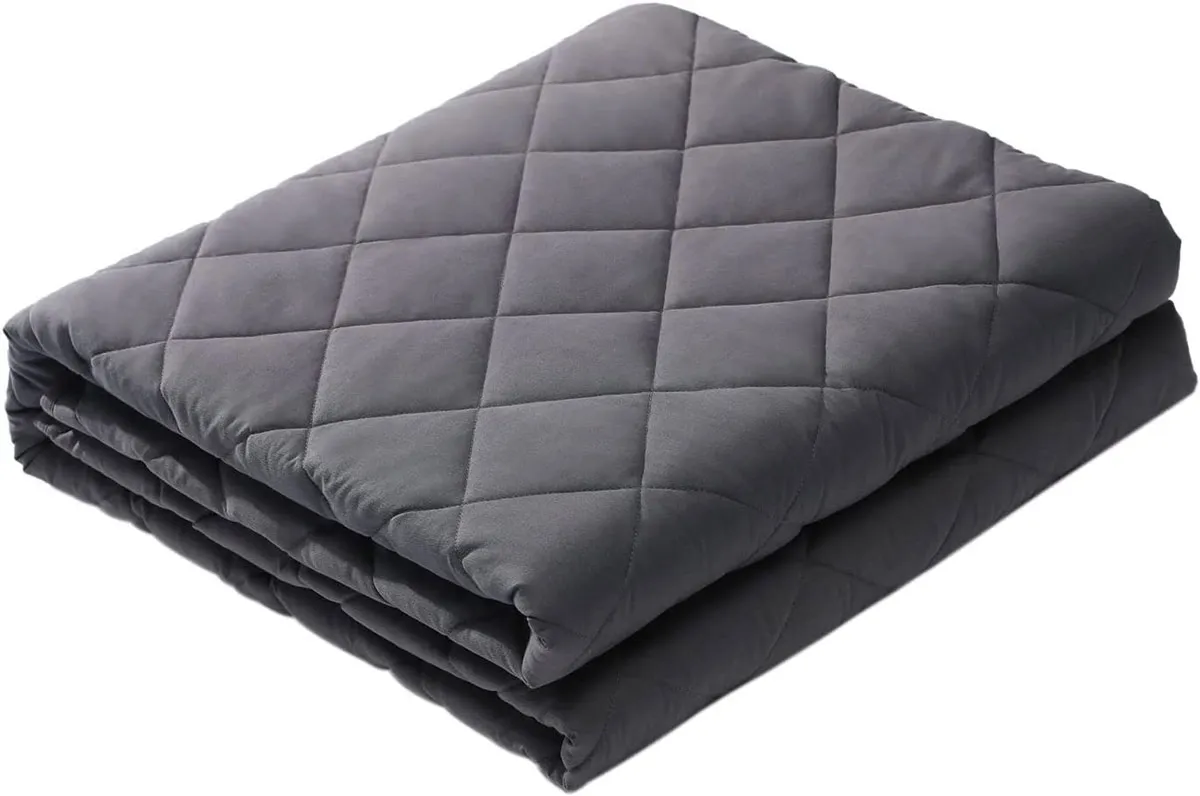
At 7.2kg, the blanket must be hand-washed. To avoid this chore too often, I invested in a changeable 5 Star United ‘King Size’ cotton blanket cover, £23.99 on Amazon.
To stop the blanket from bunching in one corner, the cover comes with togs that can be fastened to the blanket at eight points. While it can take over 15 very frustrating minutes to attach, the end result was a soft, comfortable and hygienic blanket.
Read more:
How might weighted blankets work?
So far, most weighted blanket studies have been small in scope and mainly focused on patients undergoing occupational therapy. But they have produced some interesting results.
For instance, one study of 120 psychiatric patients (those suffering from major depressive disorder, generalized anxiety disorder, bipolar disorder, or ADHD) found that the use of a weighted blanket during bedtime for over one month eased the severity of insomnia more than among patients using a light blanket during sleep.
Another study concluded that weighted blankets helped 85 individuals with ADHD or autism get to sleep faster and stay asleep. And in a 2020 study, 30 people with sleep disturbance issues, said they felt more energised after using such a blanket for six weeks.
Given the study sizes, these results aren’t conclusive. But how might the blanket produce such effects? There are two key theories.
Deep Pressure Therapy
Deep pressure therapy is when the body receives pressure that is not too hard, not too soft – something that feels like a constant hug around the body.
As Dr Rochelle Ackerley – who studies the body’s sense of touch in the Sensory and Cognitive Neuroscience Laboratory at France’s Aix-Marseille University – explains: “We have many different types of receptors in our skin that code touch and pressure. While a weighted blanket provides some pressure, it’s not going to activate all of these receptors all of the time.
“However, it could cause many slow activation receptors to fire – and when stimulated they can fire for a very long time. And this constant low-level activation is likely to be calming.
“It could be the blankets provide a background level of touch that has a kind of regulating effect on the brain. It’s saying to the body ‘stay still!’”
She adds: “But this really is just a theory. We really don’t know why they’ve had a calming effect on some people!”
Melatonin production
Others have claimed that the constant pressure of a weighted blanket increases the body’s level of melatonin, a hormone that signals to the body and brain that it’s soon time for sleep.
It’s an idea backed up by a 2022 Swedish study of 26 young and healthy individuals without sleeping disorders. Half of the participants used a weighted blanket for an hour before sleep, while the other half used a light blanket.
With salivary samples, the study found that those using weighted blankets had melatonin levels 32 per cent higher than those in light blankets after the hour.
It sounds compelling, but – despite the claims of many blanket manufacturers – this hormonal change actually has little impact in practice.
“Interestingly, we didn’t find those under weighted blankets fell asleep any faster,” Dr Christian Benedict, sleep researcher at Sweden’s Uppsala University, and one of the study’s co-authors, tells me.
Additionally, although many manufacturers claim weighted blankets encourage the release of what they describe as so-called 'happy hormones' such as oxycontin, the study found no notable evidence for this.
“We also didn’t find any difference in sleep quality. For instance, how much participants spent in slow wave sleep, how many times they woke during the night,” says Benedict.
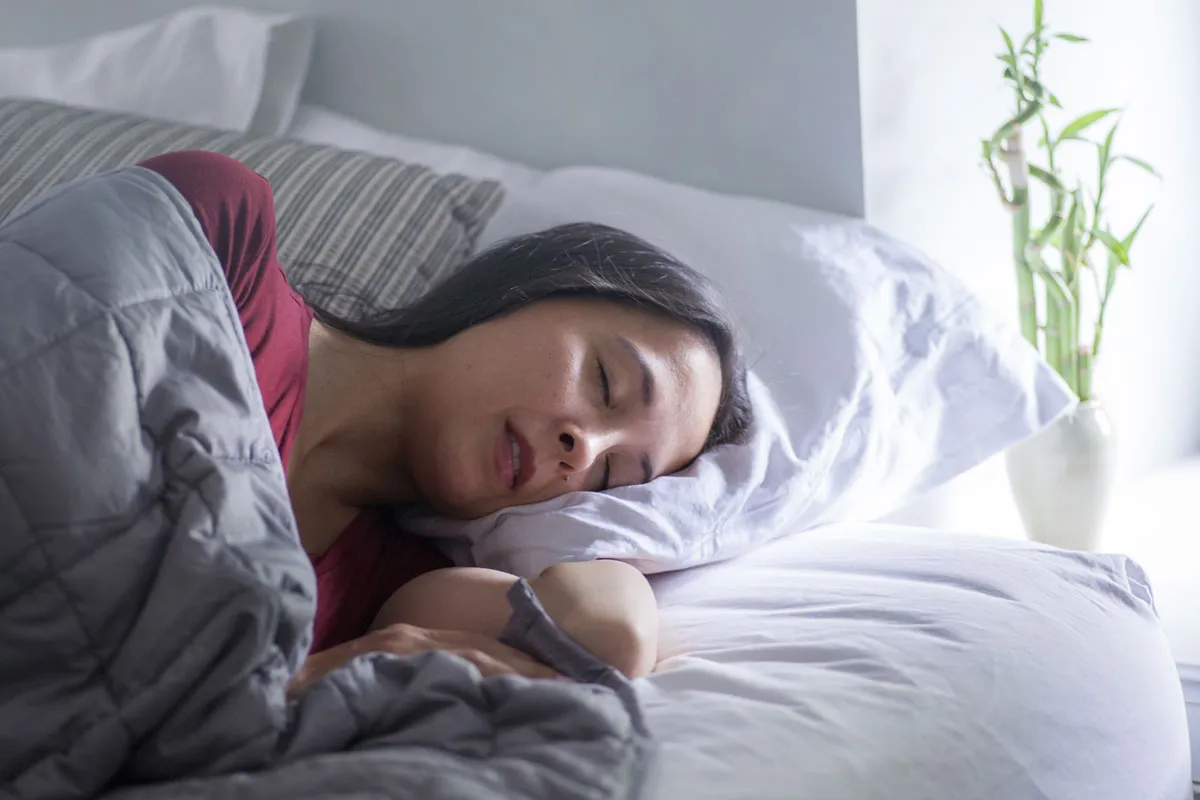
So, does a weighted blanket make you sleep better?
In my experience, absolutely. But only temporarily.
Taking a cue from Benedict’s study, I used the blanket an hour before bed, mostly while reading. I felt calmer and, by the end of the hour, I noticed my heart rate dropped below my usual resting rate.
The key difference came in the morning. I felt significantly more energised and ready to face the day. No usual snooze on my alarm clock needed – I was unstoppable. For the first two weeks, anyway. This energising effect quickly waned and I returned to what felt like my standard energy levels for the rest of the two-month period.
Disappointingly, my overall sleep quality wasn’t measurably different throughout the experiment. Specifically, it didn’t stop me from tossing and turning, something I’d do at least 25 times a night under a normal duvet. From the first night of using the weighted blanket, this number stayed the same. Other metrics, like my heart rate variability, also remain unaffected.
Throughout the two months, the blanket didn’t get me to sleep any faster, either. However, this is not usually an issue for me – I’m normally asleep 15-20 minutes after lights out.
Read More:
- 19 gadgets to help you nod off and wake up refreshed
- Poor quality sleep may scupper our attempts to keep weight off
So, why did I feel that bout of energy in the first couple of weeks? The placebo effect is certainly one explanation. But it may have been that I simply just got used to the weight of the blanket – after a while it simply no longer felt heavy.
“It’s absolutely possible that the effect of a weighted blanket attenuates over time,” Benedict said when I put my theory to him.
“In our study, we found some indication that the perceived heaviness of the blanket could have an impact on its effectiveness.
“We all have different optimal ranges. Our body’s perception of touch – what we call interoceptive awareness – could change over time, but long-term studies are needed to back this up.”
Ackerley added: “Yes, your body’s sense of touch may be able to adapt. Your skin receptors can adapt over time, but this doesn't happen overnight. However, there is also a concept called central adaption – how you perceive touch. Think about how you’re wearing clothes – you know you’re wearing clothes, but after a while you filter that out.”
Verdict
Despite initial promise, the weighted blanket ultimately did not improve my sleep over the course of two months. Whether I simply adapted to its weight, or my initial energised experience was nothing but a placebo, it didn’t have a major difference overall and I am now back sleeping (happily) under a normal duvet.
However, I am writing as somebody who doesn’t suffer from a major sleeping disorder. Contrary to what multiple manufacturers suggest, there simply isn’t an extensive stream of research to suggest that a weighted blanket can improve the sleep quality of already reasonably healthy sleepers. (Notably, neither Ackerley or Benedict sleep using a weighted blanket).
But what about if you’re somebody that finds it difficult to drift off? True, there is a small amount of evidence to suggest a blanket may help insomniacs get to sleep. But a weighted blanket is unlikely to be a silver bullet.
As Benedict explains: “A weighted blanket will never help somebody overcome the cognitive issues when it comes to insomnia. Yes, the blanket may increase melatonin levels, but it won’t suddenly get rid of insomnia. It’s nonsense to say that if everyone used weighted blankets, we’d no longer have sleep problems.
“There is a fair bit of evidence to say that weighted blankets are anxiolytic [can reduce anxiety]. The sleep studies we have now are promising, but we need a lot more. We need to better understand how they impact the body.
"We need to be examining how different weight impacts different people. And we need to examine when in the day is best to use these blankets and in what situations – if using them outside the bedroom can improve our sleep.”
Alternative weighted blankets available to buy
TheaWellbeing Blyss sensory premium weighted blanket
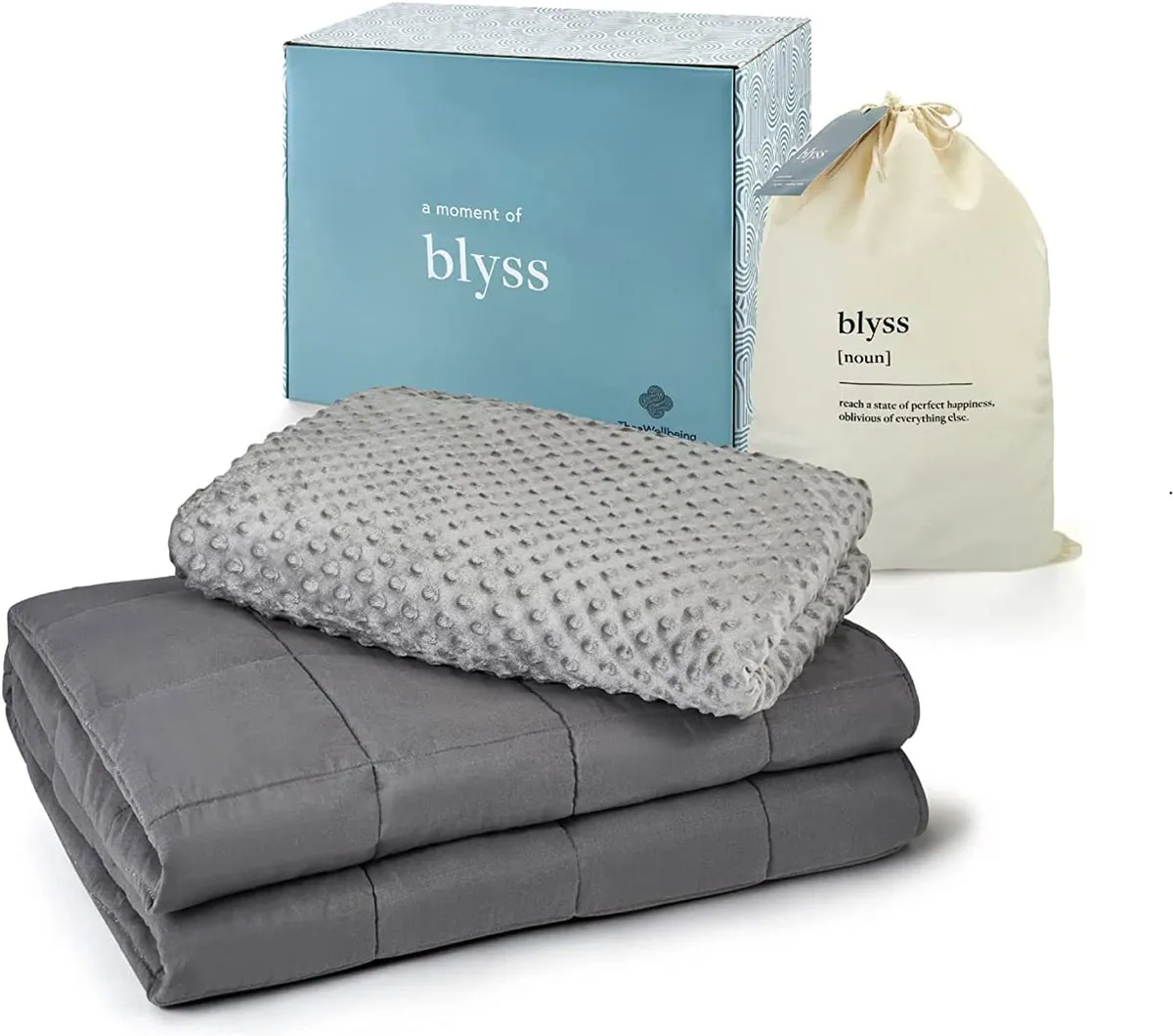
While certainly not the cheapest weighted blankets around, the TheaWellbeing comforter comes with its own machine-washable cover – something you normally have to shell out extra money for. Plus, the cover is textured with soft small circles that users report as “oddly satisfying” to the touch.
Measuring 200 x 150cm, the 6.8kg king size is one of the largest available. However, it’s still smaller than your average double duvet (200 x 200cm), so those looking to share the blanket with a partner may need an extra cover to keep their toes warm.
For those looking for something smaller, this blanket also comes in a 180 x 120cm (5.4kg) size.
- Buy now fromAmazon (£84.99), TheaWellbeing (£79.99)
Teddy Fleece weighted blanket for adults
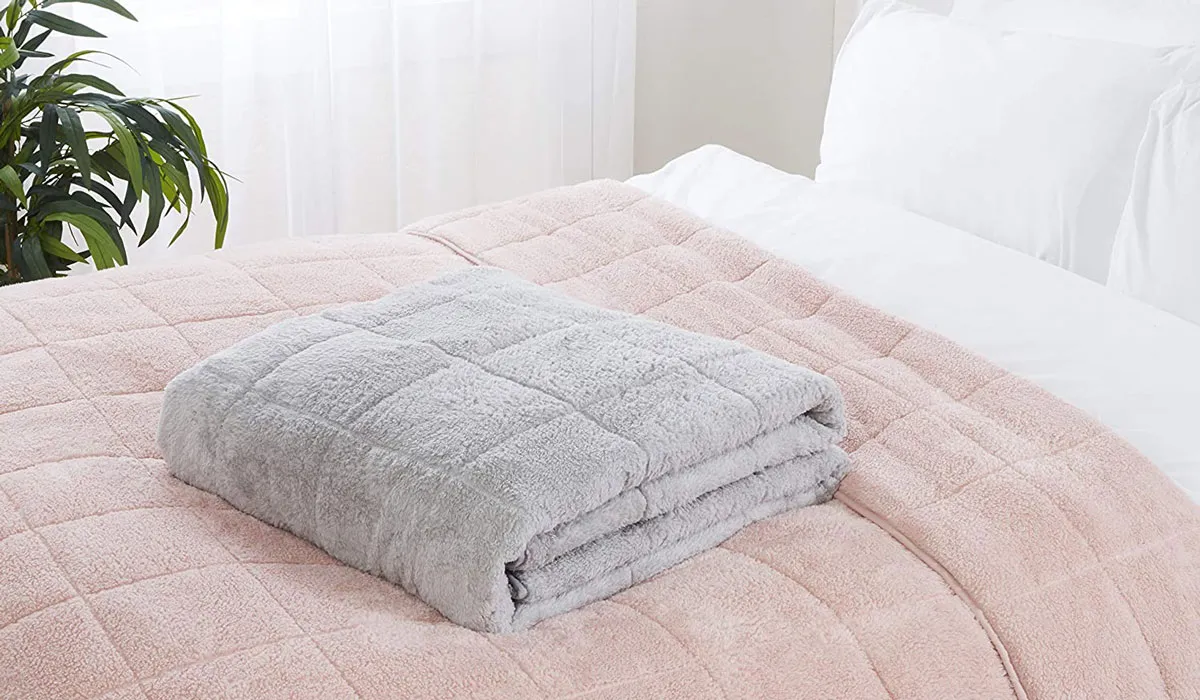
If you’re struggling to find a blanket with the right dimensions, Teddy Fleece offers four different sizes and weight options. This varies from a small single 4kg (125 x 150cm), to a hefty king 10kg blanket (150 x 200cm).
The blanket itself is made from high-density 100 per cent polyester, with internal cotton padding to ensure the glass beads within don’t make a noise when moved. It's a blanket, not a rainstick, after all.
Unfortunately, the blanket doesn’t come with its own removable cover, nor togs to easily secure a cover. And although Teddy Fleece claims that the blanket is machine washable, we would advise against chucking a 10kg weight in your next laundry load. Unless you particularly hate your washing machine, of course.
- Buy now fromAmazon (£38.99), eBay (£25.99)
Cura Pearl classic premium cotton weighted blanket
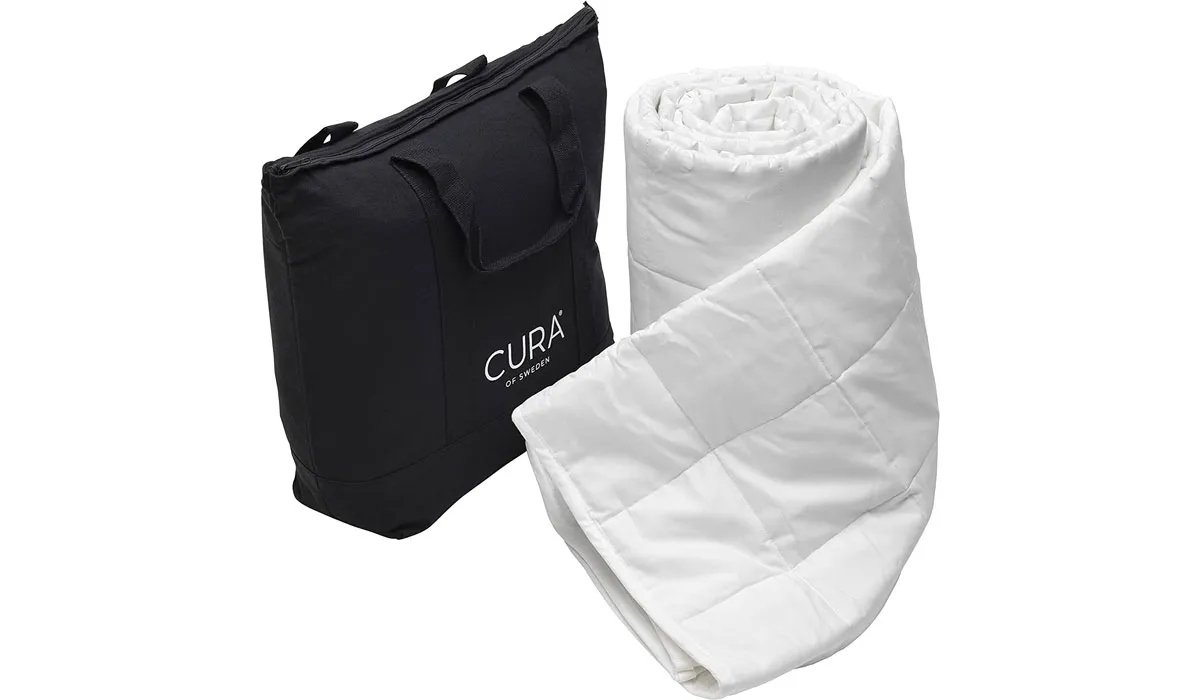
Let’s get this out the way first: yes, the health claims of manufacturer Cura are certainly overblown. For instance, there is not substantive evidence that this product or other weighted blanket promote deep sleep or the production of “feel good” hormones dopamine and serotonin.
However, this blanket is notable for its impressive bulk, with the blanket available at a whopping 11kg (150 x 210cm), which may be optimal for those looking for a heavier blanket. (Note: most health professionals advise using a blanket between 10 and 12 per cent of your bodyweight.)
And if you find this too heavy? Just send it back: the blanket comes with a 60-night no-questions-asked refund policy.
- Buy now fromAmazon (£134.99), Cura (£149)
About our experts
Dr Rochelle Ackerley researches the body’s sense of touch in the Sensory and Cognitive Neuroscience Laboratory at France’s Aix-Marseille University. She previously was a researcher at the University of Gothenberg, Sweden, and the University of Manchester.
Dr Christian Benedict is a senior lecturer and associate professor at the department of pharmaceutical biosciences at Sweden’s Uppsala University. There he studies the health impact of disturbed sleep, particularly weight gain.
Read More: